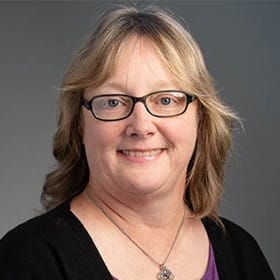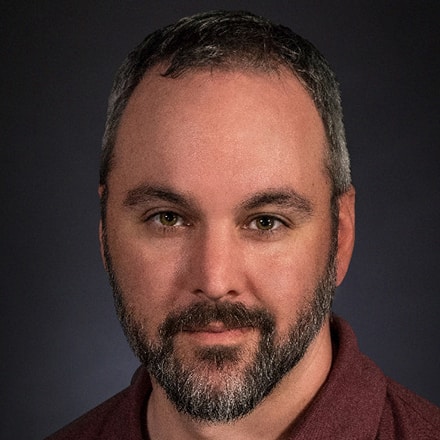Academic Spotlight: Executive Director of Social Sciences Dr. Barbara Lesniak

Dr. Barbara Lesniak is the executive director of Southern New Hampshire University’s (SNHU) online social sciences programs. She holds a master’s degree in counseling psychology and spent 15 years as a counselor at social service agencies.
Recently, she answered questions about how she connects with online students, what keeps her excited about her field and more.
Can you tell us about your professional background?
I started my career in the corporate world, working in training and development. Initially I developed and conducted in-person classes for our employees, but that shifted to computer-based training and eventually to online. This was back in the early days of the internet, and even then, it allowed us to connect with employees across the country and globally. At the time, I had no idea that it was foreshadowing my eventual career in online education.
I also had an interest in counseling and earned my master’s degree in counseling psychology while working at that company. I worked there for 15 years and did counseling on the side at a social services agency. I left the corporate side when my family moved from Chicago to Orlando but continued counseling and also did online content writing on financial and self-help topics.
What first drew you to higher education?
I considered teaching as a career option early on, but life took me in the corporate direction. In Florida, I was always looking for side gigs, especially relating to psychology. In 2012, I applied to be an online adjunct at SNHU because it seemed like a great synthesis of my training and counseling backgrounds. I fell in love with it, and when a full-time opportunity arose, I knew I had found my new career.
What aspects of your own education have been influential in shaping your career in academia?
Being trained as a counselor has been invaluable in working with students. It helps me show empathy for them and build communication lines so they’re comfortable reaching out with questions or sharing their need for support.
In the psychology program in particular, we often get students seeking to understand their own mental health challenges or those faced by family members. While I don’t act as a counselor to them, I’m able to maximize my support as an instructor to help them see what they’re capable of and support them to the finish line in my class.
What attracted you to this field of study? What keeps you excited about it?
Like many of my students, I had close family members who were affected by mental illness. I had a strong desire to understand it better and to help other people facing similar obstacles.
I still love that part, and I’m also very excited about how advances in technology, such as more precise brain imaging, have advanced knowledge so rapidly in the past couple of decades.
It also makes me happy to see the topic of mental health and neurodivergence moving to the forefront, rather than being something hidden and shameful.
How have you found ways to effectively connect with students?
I’ve found that it’s very beneficial to connect with them even before the class starts. About a week beforehand, I send them all individual emails welcoming them to my class, offering reassurances that they’ll have plenty of support to being successful, and asking them to share anything that might help me support them better. Some will share right away, and others will wait for a while, but they’ll remember that message when the time comes where they need to reach out.
I supplement my image as an “open door” instructor by continually reinforcing it in my announcements and grading feedback.
What brings you the greatest joy in your work at SNHU?
I absolutely love attending commencements and meeting some of the students with whom I’ve worked.
I also anticipate end-of-term student feedback time because it lets me see what I’m doing right and where I can improve. I have some of my favorite quotes from students on my laptop wallpaper. When I’m having a rough day, reading those quotes re-energizes me and reminds me why I do what I do.
What do you feel is unique about the faculty and students you work with?
Our faculty are some of the most caring individuals I’ve ever met. They have passion for their disciplines and real world experience to share, but they also have a keen sense of how their work can change the students’ lives.
Our students never cease to amaze me. Some are going through major challenges, like cancer treatment or home insecurity, while some face more mundane but still major roadblocks like juggling family responsibilities with multiple jobs and schoolwork. Their resilience is astounding.
What does SNHU’s mission to transform the lives of learners mean to you?
Based on the students I’ve met, I’ve come to see that it means many things. Sometimes it’s preparing that student to get a better job and improve life for themselves and their family. Sometimes it’s personal fulfillment, going back to something they had to put on hold because life got in the way. And sometimes it’s setting an example for their children, showing them possibilities and teaching them that nothing is out of reach if you work for it.
Outside of work, what’s something you’re passionate about or really enjoy doing?
I love doing 5Ks throughout the central Florida area. During the season, I do at least one a week, and I try to do one on Saturday and one on Sunday if I can find them.
A degree can change your life. Choose your program from 200+ SNHU degrees that can take you where you want to go.
Joe Cote is a writer and organic marketer at Southern New Hampshire University (SNHU), where he has worked since 2016. Previously he spent more than a dozen years as a reporter and editor at weekly and daily newspapers in Vermont and New Hampshire. He lives near SNHU's Manchester, New Hampshire campus with his wife and daughter. Connect with him on LinkedIn.
Explore more content like this article

Why Earning His BA in Political Science Mattered to Anthony Fernandez

What Can You Do With a Master’s in Criminal Justice?

Why Candace Boyer Chose Child Psychology at SNHU
About Southern New Hampshire University

SNHU is a nonprofit, accredited university with a mission to make high-quality education more accessible and affordable for everyone.
Founded in 1932, and online since 1995, we’ve helped countless students reach their goals with flexible, career-focused programs. Our 300-acre campus in Manchester, NH is home to over 3,000 students, and we serve over 135,000 students online. Visit our about SNHU page to learn more about our mission, accreditations, leadership team, national recognitions and awards.


